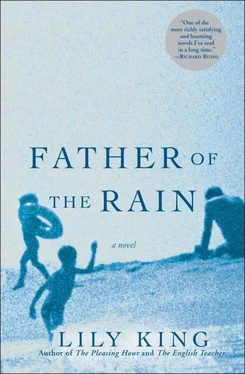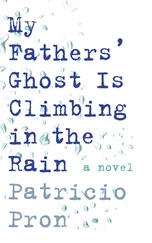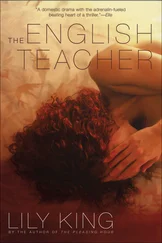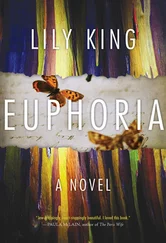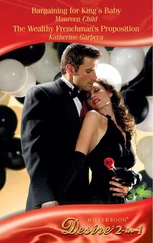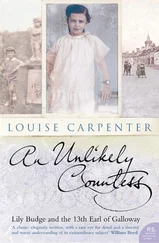“Maybe someplace like that.”
“That guy came back a fairy. He went in a perfectly nice guy and came out a fairy.”
“You need to stop drinking. You won’t be able to see anything clearly before you do.” I wait for him to lash out.
“Okay,” he says quietly. “But I won’t go anywhere.”
“Dad, you can’t do it on your own. No one can. A program is the best way. You go away and you get a lot of support and therapy.”
“Therapy? You mean a shrink?”
“Someone who can help you figure out—”
“No shrink. No way. That stays on your medical record for the rest of your life. It ruins people. Remember that wing nut McGovern picked for vice president? Never. I will not give her the satisfaction.”
“What do you mean?”
“I won’t have anyone talking about me the way they talked about Buzz.”
“No one’s going to talk—”
“Oh yes they will. You don’t know how this town talks.”
“We can say you’re coming to California with me. No one will have to know.”
“I’m staying in my house. If I leave she’ll come and take everything from me. Everything.”
“What about AA?” Julie’s uncle is in AA. He hasn’t had a drink in over twelve years. “I bet there are meetings nearby. Will you do that?”
He nods.
“Every day?”
“Yes,” he says.
“Dad, I know you’re not going to do this.”
“I am. I need to. I know I need to.” He is not convincing.
“I’ll leave and you’ll just go back to your old patterns.”
“So stay and watch me.”
“I can’t.”
A nurse comes in. She pads across the room like a child pretending to be a nurse. Her hands move efficiently, though, changing the IV bag, making a ripping sound with Velcro, sealing everything back up.
“Let me show you how the bed works, Mr. Amory.” She taps the blue and red buttons on a remote with a long fingernail. “This will sit you up and this will make you lie back down. Would you like to sit up a bit now with your daughter?”
“Yes, thank you. Ah, that’s much better. Thank you.”
“You’re welcome, Mr. Amory.”
“You’ll come back before one and show me how the tube works, right? The Sox are in Cleveland this afternoon.”
“Oh I know just where they are. And Clemens’s ankle’s worse, and they’ll probably start Ryan, Lord help us all.”
“Oh, c’mon. Six-point-five’s not good enough for you?”
“Not by a long shot.”
My father laughs. She pulls the door shut and then he looks back at me and seems to remember he’s supposed to be suicidally depressed.
“I know you need to go. I’m proud of you. I really am. I know this is no way to show it but I am, Daley.”
“Thanks.”
“You know what I keep thinking about is that time we went to get your mother a painting in Wellesley. Do you remember that day?”
“No.”
“You weren’t more than four or five. We snuck out of the house early so we didn’t have to tell her where we were going. You’d gotten yourself dressed in a little pink dress and you’d put some sort of bow in your hair all crooked, and we went to a gallery where there was this painting of the swan boats that your mother liked and we walked in, and the man there said hello and you lifted your dress up all the way and you weren’t wearing anything underneath. You should have seen the man’s face!
“You know, the saddest day in my life was the day your mother drove off. Saddest day of my life. I never thought she’d do something like that. And take you with her. Take you away from me. I know it was tough on you, but it was tough on me, too. My daughter was gone. I kind of went off the track then, you know. I shouldn’t have hooked up with Catherine so quickly. It wasn’t right. It was never right. She wanted me to be someone else. They always want you to be someone else. Even you want me to be someone else.”
“No, Dad. I want you to get sober and then see what things look like from there.” It’s slightly hallucinatory, the whole idea of him being sober, becoming self-aware.
“Oh Jesus, you sound like that girl Garvey brought home one time. What was her name? Lynnette? Lianne?”
I don’t supply the name, Lizette. I don’t say anything.
“I’d go crazy if I had to see things any more closely. Ever since Catherine my brain has been gnawing on itself.”
I know that feeling. “And you drink to stop feeling that way?”
“Oh Christ, I suppose so. If I stop with the booze, I just don’t want to turn into a guy like Bob Wuzzy. Remember him with his diet sodas? Jesus Christ.”
I can’t help smiling. “You won’t become anyone else, Dad.”
He looks out the window. I study the fine crosshatching near his eyes, the thin straight ridge of his nose. “I know you’re right,” he says without looking at me. “I know you are.” His hands are folded neatly in his lap, like a sad little boy in church. “But you’ll go and I’ll go home and it won’t feel like you’re right anymore.”
At least he knows himself this much. I have to be on campus on July ninth, ten days from now, to start an urban kinship project. I can skip the stops to see friends in Madison and Boulder. I can drive straight through, taking catnaps along the way.
“I’ll make you a deal. I’ll stay for six more days. You go to AA every day. You have one drop of alcohol and I’m gone. On top of that, you will not make racist jokes or objectifying remarks about my body. Plus you will not be allowed to insult me or my mother, or anyone else for that matter. Deal?” I put out my hand.
He unthreads his fingers and clasps my hand tightly. “Deal.”
“You’re going to be miserable.”
He gives me a thin smile. “I know it.”
We take a cab back to Ashing. It turns out my father coached the driver’s son in Little League three years in a row, a team called the Acorns.
“You remember that coach for the Pirates, big guy, big paunch?” he says to my father, looking at him intensely through the rearview mirror.
“The one who always ate the peanuts?”
“The very one.”
“He was a real beauty.”
“Prison. Five to ten.”
“Jesus. For what?”
“Nearly killed his girlfriend.”
“Jesus.” My father looks out the window a moment. We’re off the highway, going past Shining Saddles. Little girls in hard hats, no longer velvet-covered, more like helmets, are posting in a ring. He turns back to the mirror. “You remember that game against the Astros?”
“When we were down by seven?”
“And that little scrawny kid, never hit the ball in his life, Barry something—”
“Barry Corning.”
“That’s it, Barry Corning; he popped one right out there over the fence. You couldn’t wipe the grin off his face for the rest of the season.” My father rubs his hands on his pants, one of his happy gestures. “He was a good kid.”
The dogs, hungry, distraught at the disruption of their routine, circle my father even closer than normal as he comes through the door. He presses down their heads, speaks gently to them, gives them each a long rub, then squats in the middle of the kitchen to receive all their licks and nudges. Finally he gets up and goes to the pantry for their cans, and they leap and shake in excitement, their nails skittering to keep their bodies pressed to him as he moves.
My bag is still near the table, where I dropped it that morning. I look out at my stuffed car in the driveway. I don’t understand why I’m not in it. The dogs receive their food, and their collars begin to clank loudly against their blue ceramic bowls as they jerk down their smelly clumps of brown.
Читать дальше
